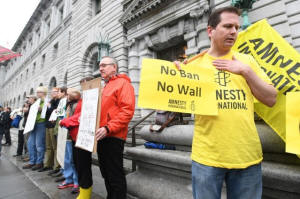|
Appeals court presses Trump
administration on travel ban
 Send a link to a friend
Send a link to a friend
 [February 08, 2017]
By Dan Levine and Emily Stephenson [February 08, 2017]
By Dan Levine and Emily Stephenson
SAN FRANCISCO/WASHINGTON (Reuters) -
President Donald Trump's order temporarily banning U.S. entry to people
from seven Muslim-majority countries came under intense scrutiny on
Tuesday from a federal appeals court that questioned whether the ban
unfairly targeted people over their religion.
During a more than hour-long oral argument, a three-judge panel of the
9th U.S. Circuit Court of Appeals pressed a government lawyer whether
the Trump administration's national security argument was backed by
evidence that people from the seven countries posed a danger.
Judge Richard Clifton, a George W. Bush appointee, posed equally tough
questions for an attorney representing Minnesota and Washington states,
which are challenging the ban. Clifton asked if a Seattle judge's
suspension of Trump's policy was "overbroad."
The 9th Circuit said at the end of the session it would issue a ruling
as soon as possible. Earlier on Tuesday, the court said it would likely
rule this week but would not issue a same-day ruling. The matter will
ultimately likely go to the U.S. Supreme Court.
Trump's Jan. 27 order barred travelers from Iran, Iraq, Libya, Somalia,
Sudan, Syria and Yemen from entering for 90 days and all refugees for
120 days, except refugees from Syria, whom he would ban indefinitely.
Trump, who took office on Jan. 20, has defended the measure, the most
divisive act of his young presidency, as necessary for national
security.

The order sparked protests and chaos at U.S. and overseas airports.
Opponents also assailed it as discriminatory against Muslims in
violation of the U.S. Constitution and applicable laws.
A federal judge in Seattle suspended the order last Friday and many
travelers who had been waylaid by the ban quickly moved to travel to the
United States while it was in limbo.
August Flentje, representing the Trump administration as special counsel
for the U.S. Justice Department, told the appellate panel that "Congress
has expressly authorized the president to suspend entry of categories of
aliens" for national security reasons.
"Thatís what the president did here," Flentje said at the start of the
oral argument conducted by telephone and live-streamed on the internet.
TOUGH QUESTIONING
When the 9th Circuit asked Flentje what evidence the executive order had
used to connect the seven countries affected by the order with terrorism
in the United States, Flentje said the "proceedings have been moving
very fast," without giving specific examples.
He said both Congress and the previous administration of Democrat Barack
Obama had determined that those seven countries posed the greatest risk
of terrorism and had in the past put stricter visa requirements on them.
"I'm not sure I'm convincing the court," Flentje said at one point.
Noah Purcell, solicitor general for the state of Washington, began his
argument urging the court to serve "as a check on executive abuses."
"The president is asking this court to abdicate that role here," Purcell
said. "The court should decline that invitation."
The judges pummeled both sides with questions. Clifton pushed both
attorneys about whether there was evidence the ban was intended to
discriminate against Muslims.
[to top of second column] |

William Butkus joins about 12 protesters outside the 9th U.S.
Circuit Court of Appeals courthouse in San Francisco, California
February 7, 2017, after the Court heard arguments regarding
President Donald Trump's temporary travel ban on people from seven
Muslim-majority countries. REUTERS/Noah Berger

"I don't think allegations cut it at this stage," Clifton told
Purcell.
Clifton later questioned Flentje after the attorney argued the
Seattle judge had second-guessed Trump's order "based on some
newspaper articles."
The judge referred to recent televised statements by former New York
Mayor Rudy Giuliani, who advised Trump during his campaign and
transition, that the president had asked him for advice about
implementing a legal Muslim ban.
"Do you deny that in fact the statements attributed to then
candidate Trump and to his political advisers and most recently Mr.
Giuliani," Clifton asked. "Do you deny that those statements were
made?"
CAMPAIGN PROMISE
Trump frequently promised during his 2016 election campaign to curb
illegal immigration, especially from Mexico, and to crack down on
Islamist violence.
National security veterans, major U.S. technology companies and law
enforcement officials from more than a dozen states have backed a
legal effort against the ban.
"I actually can't believe that we're having to fight to protect the
security, in a court system, to protect the security of our nation,"
Trump said at an event with sheriffs at the White House on Tuesday.
The legal fight over Trump's ban ultimately centers on how much
power a president has to decide who cannot enter the United States
and whether the order violates a provision of the U.S. Constitution
that prohibits laws favoring one religion over another, along with
relevant discrimination laws.
The appeals court is only looking, however, at whether the Seattle
court had the grounds to halt Trump's order while the case
challenging the underlying order proceeds.

"To be clear, all that's at issue tonight in the hearing is an
interim decision on whether the president's order is enforced or
not, until the case is heard on the actual merits of the order,"
White House spokesman Sean Spicer said.
(Additional reporting by Amanda Becker, Timothy Gardner, David
Shepardson and Julia Edwards Ainsley in Washington, Mica Rosenberg
and Leela de Kretser in New York, and Kristina Cooke and Peter
Henderson in San Francisco; Writing by Howard Goller and Amanda
Becker; Editing by Frances Kerry and Peter Cooney)
[© 2017 Thomson Reuters. All rights
reserved.]
Copyright 2017 Reuters. All rights reserved. This material may not be published,
broadcast, rewritten or redistributed. |